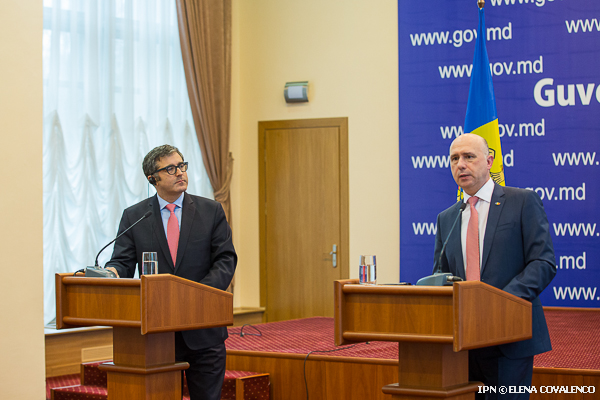The International Monetary Fund (IMF) staff and the Moldovan authorities have reached staff-level agreement on the first review under an economic reform program supported by a three-year Extended Credit Facility and Extended Fund Facility (ECF/EFF) arrangement. The staff-level agreement is subject to approval by IMF Management and the Executive Board. Consideration by the Executive Board is expected in April, following the authorities’ implementation of a number of prior actions. Completion of the review will make available SDR 15.7 million (about US$ 21.2 million). The announcement was made by the chief of the IMF mission Ben Kelmanson in a news conference held jointly with Prime Minister Pavel Filip, IPN report.
Ben Kelmanson said the Moldovan authorities have continued to make progress in tackling long-standing vulnerabilities in the financial sector and advancing structural reforms. These efforts have helped to restore financial stability, and growth has started to return. The economy is projected to grow by 4.5 percent in 2017, higher than earlier expected.
“The monetary policy continues to be focused on maintaining price stability in the context of a flexible exchange rate regime. To this end, the National Bank of Moldova should continue to improve its inflation targeting framework by strengthening operational procedures, forecasting abilities, and policy communications. The NBM should also stand ready to tighten monetary policy if inflation rises more quickly than projected,” stated Ben Kelmanson.
He also said that the 2017 budget and the medium-term budget framework are consistent with program targets and support growth-friendly measures. Key actions ahead include strengthening revenues, improving the efficiency of spending, and effective public administration reform. Resources made available from these efforts should be directed toward capital expenditure and targeted social spending. In addition, fiscal structural reforms should aim to further strengthening the fiscal framework.
For his part, Pavel Filip said the improvement of the macroeconomic indicators agreed with the IMF will lead to a 4.5% GDP growth this year, up from the 3% growth projected earlier. The experts also anticipate a 10% increase in exports and an 8% increase in imports, while the nominal average monthly salary for 2017 was forecast at 5,600 lei, which is by 10.1% higher than in 2016.
“These evaluations make us be optimistic in 2017 and I think this is justified optimism. The economic growth forecast for this year will enable us to ensure higher amounts collected into the state budget and we will thus be able to support more investments,” stated the Premier.
Pavel Filip noted it was agreed that the approval of an economic development document that will be drafted by the middle of March will be a priority. This will be used to update the National Development Strategy 2020. The set targets will also reflect the Sustainable Development Goals of the 2030 Agenda.

